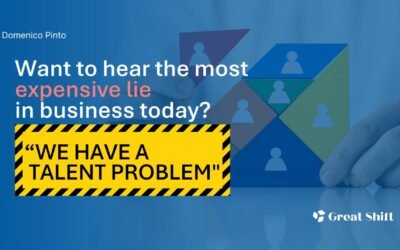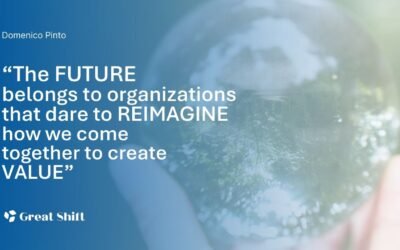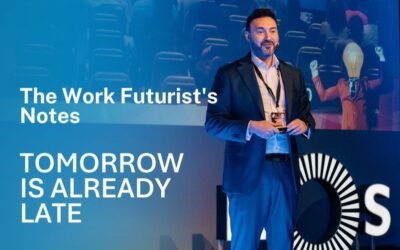A mass awakening to better ways of working
Ever since I started coaching organizations (worldwide) and even leading my own business in recent years, I realized that there was so much potential in the world of work that was yet to be explored.
Great thought leaders and pioneer businesses have always inspired me; however, even just a couple of years ago, I felt that their innovative ways of working were too far ahead of the models and settings most companies operate in. Apart from some singular initiatives, the future of work only seemed to be peeking around the corner.
If I think of an analogy for what had been happening, I think of New Year’s Eve, with all the preparation involved for that one magical moment where fireworks are fired into the sky to explode spectacularly into a spectrum of colors and shapes, each of them carefully planned to produce an unforgettable show.
COVID-19 brought about a lot of change and for some, a spark in many areas of human life.
Since the beginning of 2021, the Great Resignation or the Big Quit has been taking place, a workforce movement where thousands of people around the world decided to leave their jobs.
However, I do believe that this pandemic has catalyzed much more than a wave of resignations: it has started what I like to call The Great Shift.
For me, the Great Shift represents the coming of a new dawn. It’s a combination of situations that have been taking place over the last 5-10 years and have finally culminated in all the movements around the world of work that was sparked by COVID.
The Great Shift is a movement of reform that goes beyond work. Many people have started to question their lifestyle choices after reconsidering their priorities, examining their life expectations, and reevaluating their values and purpose.
This has surely had a great impact on their professional life.
Why? If you think about it, most people used to live for work and organize their lives around their schedule, workplace, scarce holidays, and overall professional obligations and responsibilities.
While working from home, workers began prioritizing family time, their personal and social lives, and started dedicating more time to their hobbies and passions. They understood that it was feasible to experience work-life integration without impacting business performance. Their careers and work-life were no longer at the center of everything. This is when the crisis arose and the reshuffling of our society as we knew it began.
I personally realized that I had been completely off balance. Before the pandemic, whilst I was enjoying my work, I was also constantly on the road, away from home for prolonged periods. I’d work so hard during the week that I’d allow myself small luxuries to compensate for it: I’d take myself out to dinner at a fancy restaurant, have brunch somewhere nice, go out for drinks at the best bar in town, and buy myself a new watch every three months.
That lifestyle can not compare to what my life is today. My priorities were not clear at that time and I hadn’t stopped to ask myself about my personal purpose for work. I now understand that even though I do love what I do, work can not come at the expense of every other aspect of my life.
And while I still appreciate the finer things in life and allow myself some luxuries from time to time, I realized that I prefer to enjoy the outdoors, engage in a community with shared interests, spend time with my loved ones and look after my mental health by working fewer hours. Most of my work is now done remotely so I can choose to work from a place that allows me to lead this healthier lifestyle.
More and more people nowadays also wish to find an alignment between their own purpose, values, and mission and the purpose, values, and mission of the entity they work for. When this doesn’t happen, they are having the courage to carve their own paths.
After being confined at home for months, or even for nearly two years in some countries, these are some of the questions they started asking themselves:
– I’ve dedicated such a huge amount of my time to this job. Do I feel valued and recognized in this organization? Is it aligned with my values and aspirations?
– And what work would make me get up in the morning and keep going no matter what?
– Do I want to work fully remote and choose where I want to live or go back to the office and have the same routine as before?
Avant-garde startups and businesses were agile enough to adjust or redefine the way they work to meet the new demands of the workforce. These human-centric organizations understood that the old ways would no longer retain and attract talent.
On the other hand, many companies, even big brands we have all looked up to in previous years, have been going in circles and failing to win the War for Talent.
Traditional work models are starting to crumble, and the top-down approach to leadership is becoming less and less attractive. Moreover, organizations operating in such ways are being made accountable by prospective job candidates, their workforce itself, and the platforms in which they are present.
So, going back to the firework analogy, a different set of situations have been lighting up our sky and showing different colors and ways of being in the present moment that is causing an impact, and will leave their mark on how we redefine the way we do work and the way organizations structure themselves.
As a mass awakening, whether leaders and organizations are ready or not, an inevitable shift is taking place around the world.
___________________________________________________________________
This article was also published in domenicopinto.com.





